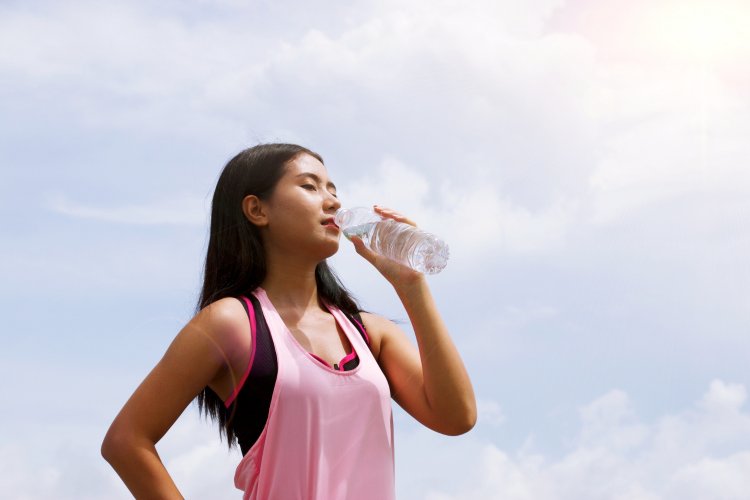Sun-Safe Strategies: 10 Tips for a Healthy Summer Season
As summer brings soaring temperatures, it's essential to prioritize your health and well-being. Here are ten meticulously detailed tips to help you stay safe and healthy during the hot summer months

Stay Hydrated Adequately
Hydration is paramount in hot weather to prevent dehydration and maintain bodily functions. Aim to drink at least 8-10 glasses of water daily. Include hydrating foods like watermelon, oranges, and cucumbers in your diet, as they contain high water content and essential electrolytes like potassium.
Effective Sun Protection
Shield your skin from harmful UV rays by applying sunscreen with broad-spectrum SPF 30 or higher. Ensure even coverage on all exposed areas of skin, and reapply every two hours, especially after swimming or sweating profusely. Wearing wide-brimmed hats and lightweight, long-sleeved clothing provides additional protection.
Optimal Clothing Choices
Choose clothing wisely to combat the heat. Lightweight, loose-fitting garments made from breathable fabrics like cotton allow air circulation, aiding in sweat evaporation and keeping you cooler. Light-colored clothing reflects sunlight, reducing heat absorption.
Strategic Sun Exposure Management
Minimize exposure to direct sunlight during peak hours, typically from 10 AM to 4 PM, when UV radiation is strongest. If outdoors, seek shade under umbrellas, trees, or canopies. Plan outdoor activities for early morning or late evening when temperatures are cooler.
Cooling Techniques
Beat the heat by utilizing various cooling strategies. Take cool showers or baths to lower body temperature. Applying cold compresses or using cooling towels on pulse points like the neck and wrists helps regulate body heat. Use fans or air conditioning indoors to maintain a comfortable environment.
Nutrition for Heat Resilience
Opt for light, hydrating meals to support overall health in hot weather. Incorporate foods rich in water content and nutrients, such as salads with leafy greens, fresh fruits like berries and grapes, and vegetables like cucumbers and bell peppers. Avoid heavy, high-fat meals that can increase metabolic heat production.
Safe Exercise Practices
Modify exercise routines to stay safe in the heat. Engage in physical activities during cooler times of the day, such as early morning or late evening. Stay hydrated before, during, and after exercise by drinking water or electrolyte-rich beverages. Wear moisture-wicking, breathable fabrics to facilitate sweat evaporation and prevent overheating.
Protective Eyewear
Safeguard your eyes from UV damage by wearing sunglasses that block 100% of UVA and UVB rays. Proper eye protection reduces the risk of eye strain, cataracts, and other UV-related eye problems.
Recognizing Heat-related Illnesses
Familiarize yourself with the symptoms of heat-related illnesses, including heat exhaustion and heatstroke. Signs of heat exhaustion may include heavy sweating, weakness, nausea, and fainting. Heatstroke symptoms include a high body temperature (>103°F/39.4°C), confusion, rapid pulse, and loss of consciousness. If you or someone exhibits these symptoms, seek immediate medical attention.
Planning and Preparation
Plan outdoor activities with weather conditions in mind. Check local forecasts for temperature and UV index predictions. Carry a reusable water bottle filled with cold water and pack snacks like fresh fruits, nuts, or granola bars for energy and hydration. Establish a heat safety plan for outdoor events or excursions, ensuring access to shaded areas and adequate hydration stations.
By implementing these detailed tips, you can enjoy a healthy and safe summer season. Prioritize hydration, sun protection, and sensible outdoor activities to optimize your well-being during warmer weather.
Disclaimer: The information provided in this article is for educational purposes only and should not be considered medical advice. If you have any health concerns or are experiencing symptoms, it is important to consult with a healthcare professional, such as a doctor or clinic, for proper diagnosis and treatment. Always seek the advice of your doctor or other qualified health provider with any questions you may have regarding a medical condition. Do not disregard professional medical advice or delay in seeking it because of something you have read in this article.
#StayHydrated #SunProtection #HeatSafety #SummerHealth #CoolingTechniques #HeatResilience #ProtectiveEyewear #ExerciseSafety #HeatIllnessAwareness #SummerPreparation
What's Your Reaction?





















